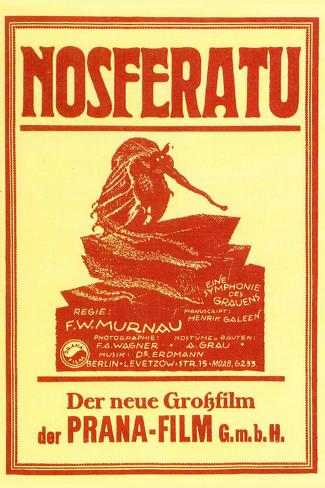← Back to Reviews
in
Nosferatu (1922) - Directed F. W. Murnau
"Do not utter it, or the images of life will fade into pale shadows and ghostly dreams will rise from your heart and feed your blood."

Nosferatu is the only film released by the studio Prana, which went bankrupt after the widow of Bram Stoker sued for copyright infringement since Nosferatu was really an unofficial adaptation of Bram Stoker's novel, Dracula. Despite this, the film was a massive success with the critics. I agree a little bit, but there are problems.
This adaptation of the novel centers around the nosferatu himself, Count Orlok, making his way to Germany and begins a killing spree which the townsfolk believe to be a rumored plague. ANd the only one who may be able to stop the vampire is the young bride of a real estate agent.
To get the good stuff out of the way, the movie is wonderfully shot and directed. This is my first F. W. Murnau film, and I enjoyed the direction. I love the way Murnau shot Nosferatu's shadows, adding an essential part in vampire movies to come. I'm now greatly looking forward to his other hits like Sunrise and City Girl. And Max Schreck (not to be confused with the Batman character) plays a wonderful vampire. His over-the-top appearance and slow movements add a lot to the movie.
The first half-hour of this ninety minute silent movie kept my attention throughout most of it because the characters had their own level of attitude and relatability that fits with some of the campier silent-era aspects of the film, like... say, Schreck's makeup. And the vampire elements of the story were played well for that time.
But now I'll cover the bad stuff: there wasn't enough of Orlok. The subplot of the townspeople believing Orlok's killings to be a plague was too much of a focus. And there was also too much emphasis on the mystery aspects of the movie to the point where it didn't feel like a vampire movie. And third of all, why does the woman who can stop Nosferatu specifically have to be a sinless woman? They never really cover that.
Overall, I liked a lot about the movie, but there were some obvious things Murnau focused too much on. Still, it was quite enjoyable throughout most of it, so I'd still say it was a great silent-era movie. Normally I get bothered by things like a lack of character development and unrealistic sets, but it's still a silent movie.
"Do not utter it, or the images of life will fade into pale shadows and ghostly dreams will rise from your heart and feed your blood."

Nosferatu is the only film released by the studio Prana, which went bankrupt after the widow of Bram Stoker sued for copyright infringement since Nosferatu was really an unofficial adaptation of Bram Stoker's novel, Dracula. Despite this, the film was a massive success with the critics. I agree a little bit, but there are problems.
This adaptation of the novel centers around the nosferatu himself, Count Orlok, making his way to Germany and begins a killing spree which the townsfolk believe to be a rumored plague. ANd the only one who may be able to stop the vampire is the young bride of a real estate agent.
To get the good stuff out of the way, the movie is wonderfully shot and directed. This is my first F. W. Murnau film, and I enjoyed the direction. I love the way Murnau shot Nosferatu's shadows, adding an essential part in vampire movies to come. I'm now greatly looking forward to his other hits like Sunrise and City Girl. And Max Schreck (not to be confused with the Batman character) plays a wonderful vampire. His over-the-top appearance and slow movements add a lot to the movie.
The first half-hour of this ninety minute silent movie kept my attention throughout most of it because the characters had their own level of attitude and relatability that fits with some of the campier silent-era aspects of the film, like... say, Schreck's makeup. And the vampire elements of the story were played well for that time.
But now I'll cover the bad stuff: there wasn't enough of Orlok. The subplot of the townspeople believing Orlok's killings to be a plague was too much of a focus. And there was also too much emphasis on the mystery aspects of the movie to the point where it didn't feel like a vampire movie. And third of all, why does the woman who can stop Nosferatu specifically have to be a sinless woman? They never really cover that.
Overall, I liked a lot about the movie, but there were some obvious things Murnau focused too much on. Still, it was quite enjoyable throughout most of it, so I'd still say it was a great silent-era movie. Normally I get bothered by things like a lack of character development and unrealistic sets, but it's still a silent movie.
